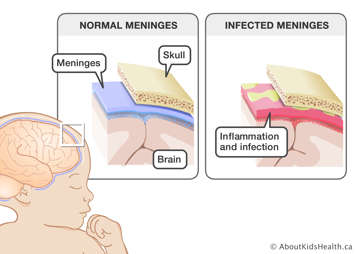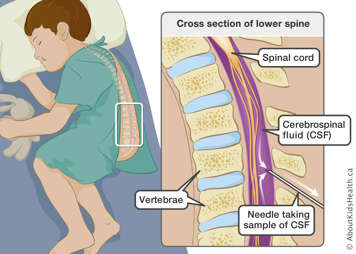What is meningitis?
Meningitis is an infection of the fluid and protective layers of tissue around a person's spinal cord and brain. This fluid is called cerebrospinal fluid, or CSF.
Meningitis is sometimes called spinal meningitis.

Meningitis looks different in babies than in children
Children more than two years old
People who are more than two years old usually have the following symptoms of meningitis:
These symptoms can develop over several hours, or they may take one to two days or even more.
Other symptoms of meningitis may include the following:
- feeling sick to the stomach (nausea)
- throwing up (vomiting)
- discomfort looking into bright lights
- confusion
- sleepiness
As the infection goes on, patients of any age may have seizures.
Babies and children up to two years old
In babies, meningitis looks different. Babies with meningitis may have the following symptoms:
- not moving much or doing much
- being irritable or cranky
- throwing up (vomiting)
- not feeding well
- fever
Babies may not have the symptoms older children get, such as headache and a stiff neck.
As the infection goes on without being treated, patients of any age may have seizures.
Neonatal meningitis
Meningitis occurring in the first 28 days of a baby’s life is called neonatal meningitis. Premature infants, and those with low birth weight, are at higher risk for developing neonatal meningitis. Other risk factors for meningitis in any newborn occur when the water breaks early, there is maternal fever or infection, or there are complications during delivery. The symptoms of neonatal meningitis can be subtle and may include:
- irritability
- poor feeding
- temperature instability
- lethargy (sleepiness)
- respiratory distress
Meningitis is usually caused by a virus or bacteria
How your child is treated will depend on what is causing the meningitis.
Viral meningitis
If meningitis is caused by a virus, it is called viral meningitis. Viral meningitis is usually not dangerous. It usually goes away without specific treatment. Some viruses can cause a more severe form of meningitis. For example, herpes simplex virus can cause severe disease and is therefore treated with antiviral medications.
Bacterial meningitis
If meningitis is caused by bacteria, it is called bacterial meningitis. Bacterial meningitis can be very dangerous and is the most common cause of neonatal meningitis. It can cause brain damage, seizures, hearing loss or learning disabilities. Group B Streptococcus (GBS) is a known, common bacteria that is present in the genitourinary tract. This is often tested for during the late stages of pregnancy. Pregnant people who have a positive GBS test may receive antibiotics during labour to reduce the risk of infection spreading to the newborn.
Bacterial meningitis is treated with antibiotics that are given directly into your child's blood through an intravenous (IV) needle. Usually, these antibiotics can cure bacterial meningitis. It is important to start treatment as early as possible.
There are several types of bacterial meningitis. Antibiotics can prevent some types from spreading and infecting other people. For this reason, it is important to know which type of bacteria is causing the meningitis.
Meningitis can be spread to other people
Some forms of bacterial meningitis are contagious. Contagious means they can spread to other people. The bacteria are spread when someone touches mucus from the mouth or nose of an infected person. Some ways to spread meningitis are:
- coughing
- kissing
- drinking from the same cup
Meningitis does not spread as easily as infections such as the common cold or the flu. It is not spread by casual contact. You cannot get meningitis by breathing the air where a person with meningitis has been.
Meningitis is an infection that must be reported to the Public Health Department. The Public Health Department in your area may contact you for more information about your child and how they got meningitis.
Avoiding close contact with meningitis patients
People who are likely to catch meningitis from an infected person include the following:
- a boyfriend or girlfriend
- family members in the same house
- people at a school or day care with the person with meningitis
These people are called "close contacts" of the person with meningitis.
If you or people in your family are close contacts of a person with meningitis, see your doctor. You may need to take antibiotics so that you do not get meningitis.
If you think your child might have meningitis, take them to a doctor right away

If your child has symptoms of meningitis, take them to see a doctor right away. It is very important to find and treat meningitis as soon as possible.
Doctors usually find out if a child has meningitis by testing the fluid around their brain and spinal cord (CSF). To get a sample of your child's CSF, the doctor will do a lumbar puncture. The doctor puts a needle into your child's back, low down where CSF is easily available. This test is also called a spinal tap.
A lab will then test the sample to find out the type of meningitis. When the doctor knows which type of meningitis your child has, they can make sure your child is getting the right treatment.
If your child is in hospital with meningitis
If your child is in hospital with meningitis, the staff caring for your child will need to make sure the infection does not spread to other people. These are some ways to prevent meningitis from spreading:
- Your child will be placed in a single room. They may not be able to visit the playroom. Ask the Child Life Specialist to bring toys and supplies to your room.
- Hospital staff will wear a mask, eye protection, gloves and a gown when they visit, at least for the first 24 hours after your child has been on antibiotics.
- Wash your hands with soap and water before and after touching your child and before leaving your child's room. Hospital staff should do this as well.
- You and other family members and close contacts may have to take antibiotics.
If you or anyone else who has visited becomes ill with symptoms of meningitis, let your child's doctor or nurse know as soon as possible.
Vaccines can prevent some types of meningitis
There are vaccines (shots) that help prevent some types of bacterial meningitis. The following are some of the bacteria there are shots for:
- Haemophilus influenzae type b (Hib) meningitis
- Some types of Neisseria meningitidis
- Many types of Streptococcus pneumoniae
These vaccines can help stop the disease from spreading to other people. These vaccines may be available free where you live. Ask your primary care provider.
Complications of bacterial meningitis
Bacterial meningitis, especially in infants and babies, can lead to complications. It can cause brain damage, seizures, hearing loss or learning disabilities. Sometimes, the infection can lead to abscesses (collections of pus) in or around the brain or hydrocephalus (a build-up of fluid around the brain). There are several tests that may be performed to monitor for complications, including head ultrasound, brain MRI, EEG and a hearing test.
Follow-up care for meningitis
Many children recover well after treatment for meningitis. However, infants who have had neonatal meningitis and older babies and children who have had complications related to bacterial meningitis benefit from long-term follow-up to monitor their growth and development.